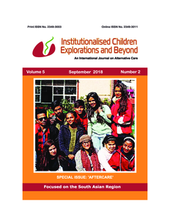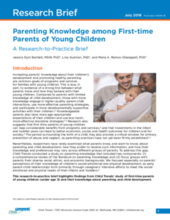Displaying 191 - 200 of 490
The purpose of this study was to assess changes in self-reported practices and perceptions of child welfare staff involved in a multifaceted, statewide TIC intervention.
This study reviews a series of interrelated studies on the development of children residing in institutions (i.e., orphanages) in the Russian Federation or placed with families in the USA and the Russian Federation.
This thesis study aimed to explore what Looked After Children (LAC) value in their friendships in order to understand what support may help them gain the maximum benefits from these relationships.
This 10th issue of the Institutionalised Children Explorations and Beyond (ICEB) journal, released in September 2018, is a Special Focus issue on ‘Aftercare.’
The current longitudinal study examined the prevalence, overlap, and impact of adverse childhood experiences (ACEs) in a sample of Brazilian children and adolescents who use city streets as spaces for socialization and survival (i.e., street-involved youth).
This book explains the neurological, emotional, and behavioral impacts of violence and trauma experienced by newborns, infants, children, and teenagers.
This article explores the impacts of two common forms of early childhood adversity, maltreatment and placement in institutional care, on children's behavioral, psychiatric, and physical health into adulthood.
This project, designed to explore parenting practices across various regions within Zambia, aims to further advance ongoing efforts to support early childhood development (ECD) by informing parenting programmes intended to promote optimal child development.
This research-to-practice brief highlights findings from Child Trends’ study of first-time parents of young children (under age 3) and their knowledge about parenting and child development.
The current study from the Infant Mental Health Journal addressed whether two institution‐wide interventions in St. Petersburg, Russian Federation, that increased caregiver sensitivity (Training Only: TO) or both caregiver sensitivity and consistency (Training plus Structural Changes: T+SC) promoted better socioemotional and cognitive development than did a No Intervention (NoI) institution during the first year of life for children who were placed soon after birth.



